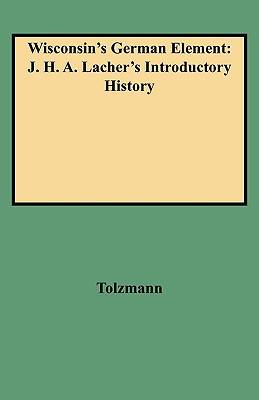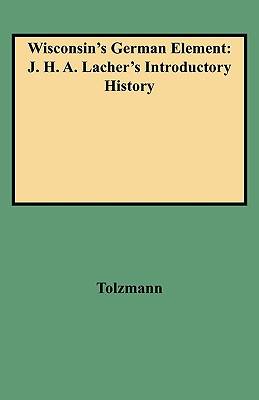
- Retrait gratuit dans votre magasin Club
- 7.000.000 titres dans notre catalogue
- Payer en toute sécurité
- Toujours un magasin près de chez vous
- Retrait gratuit dans votre magasin Club
- 7.000.0000 titres dans notre catalogue
- Payer en toute sécurité
- Toujours un magasin près de chez vous
Wisconsin's German Element
J. H. A. Lacher's Introductory History
Don Heinrich Tolzmann
Livre broché | Anglais
18,45 €
+ 36 points
Description
J. H. A. Lacher's treatise on the German element of Wisconsin, originally published by a division of the Steuben Society of America in 1925, is still the standard introduction to its subject. It has now been edited for republication by German-American authority Don Heinrich Tolzmann. The first section of the work focuses on Wisconsin's rich German religious establishment: Catholics, Lutherans, German Evangelical Synod, German Reformed, Evangelical Association, Liberals and Jews, and it gives the names and places of origin and settlement of pioneering clergymen and other immigrants in the various denominations. Section Two looks at representative German-Americans and their vocations in Wisconsin, with emphasis upon agriculture, art, education, temperance, business, music, cuisine, medicine, and the bar. One of the keys to Germans' assimilation in America was the ease with which they were able to transplant various social and cultural institutions in the building of a German-American identity in their adopted homeland. This is borne out in the third section of the book, which homes in upon Wisconsin German politics, the German press, sports, thrift, men of letters, German place names and patronymics, and the impact of World War I. Genealogists will find references to some 750 German surnames at the back of this volume, while persons seeking to do further research into Wisconsin German history or genealogy should consult the selective bibliography at the back of the book, which has been updated by the editor.
Spécifications
Parties prenantes
- Auteur(s) :
- Editeur:
Contenu
- Nombre de pages :
- 92
- Langue:
- Anglais
Caractéristiques
- EAN:
- 9780806349091
- Date de parution :
- 01-06-09
- Format:
- Livre broché
- Format numérique:
- Trade paperback (VS)
- Dimensions :
- 140 mm x 216 mm
- Poids :
- 117 g

Les avis
Nous publions uniquement les avis qui respectent les conditions requises. Consultez nos conditions pour les avis.






